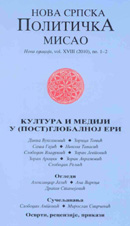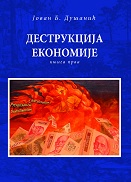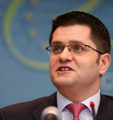| NSPM in English | |||
Serbia will be a bridge between the European Union and the African Union |
 |
 |
 |
| понедељак, 01. фебруар 2010. | |
|
(Addis Ababa, 28 January 2010)
Venerable Commission Chairperson Ping, Honorable Commissioners, My Fellow Foreign Ministers and Heads of Delegations, Excellencies, Ladies and Gentlemen, Thank you for the distinct privilege to address the African Union today. Allow me to emphasize my sincere appreciation to our Ethiopian hosts for their excellent organization and warm hospitality. My country has stood firmly with Africa throughout its contemporary history. Our capital, Belgrade, is a city generations of Africans recall with great fondness. It hosted the First Non-Aligned Movement Summit in 1961, with a number of African countries in attendance. In order to honor that legacy with a fitting tribute to its founders, we have proposed that its fiftieth anniversary be celebrated where it all began, in Belgrade, with an extraordinary Summit under the Egyptian chairmanship in 2011. Mr. Chairman, Serbia is the largest successor state to Yugoslavia. Under President Tito, we actively and consistently supported Africa’s national liberation struggles for decades. As a true and unconditional friend, we encouraged the states of this great continent to assert their pride of place in the international community. My country also helped to build up Africa’s economies through development assistance, infrastructure projects, and the university education of its students. Moreover, we have traditionally contributed to enhancing the peace and stability of the continent. Since the 1950s, my country has worked with the United Nations on a number of peacekeeping missions across Africa. Today, the Republic of Serbia participates in four UN operations. In the Democratic Republic of Congo and Chad, medical teams and field hospitals are present on the ground in rural areas, helping to provide much-needed health services to local populations. And in Liberia and Côte d’Ivoire, we have deployed military and police observers to enhance the security situation in the region, enabling people to rebuild their lives in a safe post-conflict environment. Mr. Chairman, The Republic of Serbia is deeply committed to comprehensively enhance our relations with the African Union and its member States. In the field of education, as of this year, we will offer hundreds of new scholarships for students to attend Serbian universities. Regarding agriculture, we offer our expertise in order to help enhance food production and increase crop yields. When it comes to trade and investment, we will work on optimizing Africa’s competitive advantages, by deepening existing economic relationships, and creating new ones across this continent. In the political sphere, I want to underline that Serbia will soon join the European Union. At the same time, we will keep emphasizing our conviction that international stability and prosperity cannot be consolidated without taking into account the views of important actors on the world stage, such as the African Union. We believe that, in the interdependent world of the 21st century, Serbia’s membership in the European Union would give a new, more profound meaning to our relations with AU member states. This would not only ensure that more than forty African nations would have a true friend in Brussels, but it would also lead to an increase in both understanding and cooperation between the two Unions. I am in no doubt that this would be advantageous to everyone concerned. Let me underline the fact that as an observer country, Serbia fully supports the Vision and Objectives of the African Union, rooted in the United Nations Charter—including those provisions related to the obligation to uphold the sovereignty and territorial integrity of states. Mr. Chairman, This brings me to one of the most profound challenges my country and the international community face today—that is, the attempt by the ethnic-Albanian authorities of our southern province of Kosovo to secede from Serbia, through a unilateral declaration of secession. In the name of the Republic of Serbia, I would like to express my profound appreciation to the over eighty percent of African Union countries that have not recognized the separatists in Kosovo. Your support for our sovereignty and territorial integrity is truly gratifying. From the onset of this grave crisis, we decided to respond to the illegitimate effort to forcibly partition Serbia in a peaceful manner, and with maximal restraint. We chose to harness all the diplomatic resources at our disposal to counter secession, and contain its potentially destabilizing consequences. Thanks to the overwhelming support achieved in the UN General Assembly, the International Court of Justice was tasked with ruling on the legality of Kosovo’s attempt at secession. The Court’s decision is expected this year. I have come here to plead that you maintain your principled reservation on the Kosovo issue. This case will constitute a strong precedent. It marks the first time ever that the Court has been asked to consider the legality of a unilateral attempt by an ethnic minority to secede from a UN member State in peacetime, in defiance of its Constitution and the will of the Security Council. Accordingly, the Court’s conclusions will have extensive consequences for the entire international community—perhaps for African Union states most of all. Imagine how many UN member States of this great continent would be affected by the legitimization of forcible partition. The borders of every multiethnic state could be threatened, producing instability in all corners of Africa. Progress, development, human rights, and ultimately—peace, would be jeopardized. The achievements of generations of African statesmen would be set back, as the number of crises multiplies. That is why it is imperative—why it is absolutely critical—for the Court to be allowed to do its job, unhindered by political pressures, such as further recognitions of Kosovo’s separatists. It is the only way to avoid doing any further damage to the legitimacy of the international system and the universality of the values we hold in common. And it is the only way to re-open the window of opportunity behind which stands the prospect of a negotiated, compromise solution to the province’s future status. In short, we ask all the non-recognizing countries represented in this room to stay the course, by not accepting Kosovo’s attempted secession. We do so not only in the name of our traditional ties of friendship, but in the name of working together to consolidate a rules-based international order for the 21st century—one in which secession is clearly seen as a dangerous threat, and one in which reaching agreement between the parties is the only legitimate, sustainable way forward. By holding the line—by maintaining respect for Serbia’s sovereignty and territorial integrity—we will help ensure that international law continues to close in on separatists, present and future, who hope that Kosovo’s unilateralism will be allowed to prevail. Thank you very much, Mr. Chairman. |
Од истог аутора
- Из архиве - Remarks Before the Foreign Affairs Committee of the European Parliament
- From Balkan Wars to Balkan Peace
- Serbia is dedicated to solving all differences at the negotiating table
- Our Kosovo policy will not change
- 2009 was Serbia’s best EU accession year ever
- We will never recognize UDI
- Kosovo is without a doubt the darkest corner of Europe
- Serbia, the United States, and the Riddle of Europe
- Kosovo is our Jerusalem
- Minister of Foreign Affairs Vuk Jeremic’s Speech at the UN SC
- Address Before the Second Serbian Ambassadors’ Conference
- One Nation, Indivisible
Остали чланци у рубрици
- Playing With Fire in Ukraine
- Kosovo as a res extra commercium and the alchemy of colonization
- The Balkans XX years after NATO aggression: the case of the Republic of Srpska – past, present and future
- Из архиве - Remarks Before the Foreign Affairs Committee of the European Parliament
- Dysfunction in the Balkans - Can the Post-Yugoslav Settlement Survive?
- Serbia’s latest would-be savior is a modernizer, a strongman - or both
- Why the Ukraine Crisis Is the West’s Fault
- The Ghosts of World War I Circle over Ukraine
- Nato's action plan in Ukraine is right out of Dr Strangelove
- Why Yanukovych Said No to Europe

.jpg)








 steemed Executive Council Chairman Kussa,
steemed Executive Council Chairman Kussa,












